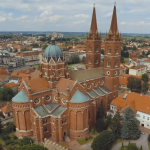November the 25th, 2019 – The territory of Croatia has changed dramatically over thousands of years, as this country and its wider region have been engulfed in wars, conquests and changes of powers, changes of state, and tumultuous times.
From ancient times right up until the modern day, the modern territory of Croatia has ”changed hands” numerous times. Owing to its location on the map of Europe, at the crossroads between the Southeastern and Central parts of our continent, Croatia has unfortunately been at the forefront of many a conquest, invasion, and change of official borders. While these events have had devastating effects on the country throughout its history, it is just a small part of what makes Croatia such a deeply interesting little nation.
The territory of Croatia has been inhabited since the Paleolithic Age, with the Croats having first arrived and settled in this area way back during the sixth century. It wasn’t until 897, when Duke Branimir ruled, that Croatia was recognised as independent by the rest of the world. Following recognition as an independent state of its own, King Tomislav’s reign began, and the country transformed into a kingdom, a status it held for two centuries before entering into a union with neighbouring Hungary.
Time passed, and then the conquests of the marauding Ottoman Empire began to threaten the nation, as it had to several others surrounding it. The Hundred Years’ Croatian-Ottoman War is an incredibly interesting period of Croatia’s ancient history and is definitely worth reading about. The conflicts, which were obviously numerous but not particularly intense, went on for as long as the name of these events states, and encompassed a war between the former Ottoman Empire and the then Medieval Kingdom of Croatia.
It’s difficult to imagine just how the territory of Croatia shifted during these tumultuous times, and reading about it only goes so far. Watch the video below to get a real feel of how things changed:
Make sure to follow our dedicated lifestyle page for much more.








